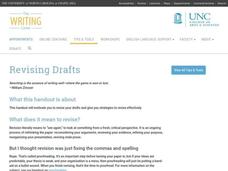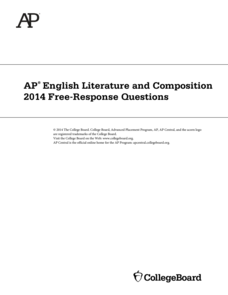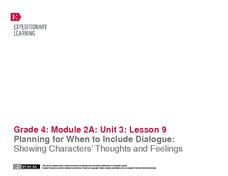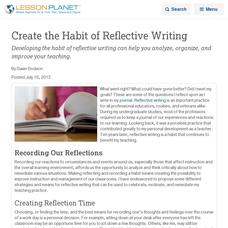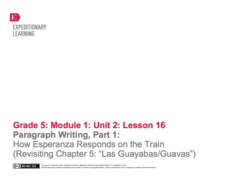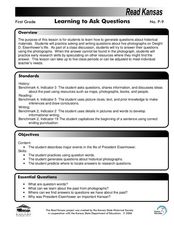Read Works
How to Say “I Ruff You”
Who says you need a human to be your valentine on Valentine's Day? Give your dog-loving readers an inspiring perspective on how a sister givdes her brother a valentine from the family dog. They then answer 10 questions thatd involve...
College Board
2008 AP® English Literature and Composition Free-Response Questions Form B
Ever wondered what your dog is thinking? Scholars take a close look at two poems written through the eyes of animals and then create essays analyzing each author's technique. Pupils also read a passage to write about the literary...
University of North Carolina
Revising Drafts
Don't simply proofread ... revise instead! Revising drafts is the topic of the 17th handout in UNC's Writing the Paper series of 24 lessons. Writers discover the importance of revision, as well as steps to follow during the process.
University of North Carolina
Plagiarism
As many unfortunate journalists have learned, taking someone else's ideas and passing them off as your own is never a good idea. It's called plagiarism—and it's a big deal. Thankfully, a handout helps writers learn how to avoid...
Schoolwires
12th Grade Expository Reading and Writing Research Project
The beauty in this resource is the lengthy list of highly charged, controversial-issue research topics. Categories include issues of race, politics, law, environment, education, athletics, gender, and technology. After selecting a topic,...
Student Handouts
Four-Square Writing Method
Pupils produce paragraphs with planning and precision with the four-square writing method, which allows learners to organize the topic, supporting, and summary sentences of their paragraphs.
College Board
2007 AP® English Literature and Composition Free-Response Questions
Scholars use the 2007 AP® English Literature and Composition Free-Response Questions to write essays examining how a character's tie to the past affects the story. The resource also requires pupils to write essays comparing two related...
College Board
2014 AP® English Literature and Composition Free-Response Questions
How much would you give up for others? The last prompt in 2014 AP® English Literature and Composition Free-Response Questions asks scholars to write essays about a character in a piece of work that has sacrificed and what the sacrifice...
EngageNY
Planning for When to Include Dialogue: Showing Characters’ Thoughts and Feelings
Young writers examine dialogue conventions, including indentation, quotation marks, and expressing thoughts and feelings through a fictional text. By noticing where and when authors use dialogue, they decide how to incorporate dialogue...
Penguin Books
A Teacher's Guide to The Omnivore’s Dilemma: A Natural History of Four Meals by Michael Pollan
"What should we have for dinner?" "What am I eating?" "Where did it come from?" These three questions are at the heart of Michael Pollan's The Omnivore's Dilemma: A Natural History of Four Meals. Pollan's book provides some very...
Santa Ana Unified School District
Getting to the Core: Early American Poets
How do poets convey emotion and represent their views of life? Pupils learn more about Whitman and Dickinson through the unit and analyze their bold reinvention of craft and style for poets to come. Looking at classic pieces such as...
Curated OER
Lesson Learned: Creating a Life Reports Project
Tap into the wisdom and knowledge of older members of the community with this New York Times plan. To warm up, learners write about and discuss advice they have been given. After reading "The Life Report," an op-ed column that asks older...
Curated OER
Create the Habit of Reflective Writing
Developing the habit of reflective writing can help you analyze, organize, and improve your teaching.
Curated OER
Writing a Screenplay
It's time to make a movie! Kids follow 15 steps to take their movie ideas from concept to script, following clear examples. The resource includes creative ways to guide learners into developing a few words and concepts into fully...
University of North Carolina
Psychology
Psychology, the scientific study of the human mind and behavior, is a popular major for many college students. An informative handout outlines common assignments in psychology courses. Scholars see how to design a research proposal,...
EngageNY
Paragraph Writing, Part 1: How Esperanza Responds on the Train (Revisiting Chapter 5: "Las Guayabas/Guavas")
When your class members have completed the novel Esperanza Rising, they will be ready to write an expository essay on how Esperanza responds to events and what this says about her character. Set your pupils up for success by starting out...
Curated OER
Learning to Ask Questions
First graders analyze historical materials and create questions about Dwight D. Eisenhower. In this question writing lesson, 1st graders ask and answer questions about the life of Eisenhower. Students write about photographs they view.
EngageNY
Writing, Critique, and Revising: Two-Voice Poems (Chapter 14: "Las Ucas/Grapes")
Continue work on the two-piece poem that compares two characters from Esperanza Rising. Give class members a few minutes to finish their drafts. After they have a complete product, model how to critique and edit the poems with one group....
Polk Bros Foundation
Answer the BIG Question with Cited Examples and Evidence
Close up your unit of study with an examination of one of the guiding or essential questions as it relates to what your class has studied and other research. Class members first write down the question. Then they note down information...
Pearson
The Simple Past: Yes/No and WH- Questions
Were you in an accident? How did it happen? Pupils practice asking and answering questions with a language arts slideshow presentation. As they work on describing past events to explain a current condition, individuals take a look at the...
Curated OER
Working in your Cubicle: Critical Thinking and Writing
Explore informative and explanatory writing with this lesson. Using a cube labeled with directives to describe, analyze, compare, associate, apply, and argue the topic, middle schoolers work individually or in groups to answer questions....
Curated OER
Descriptive Writing Using the Book Rumpelstiltskin
Use the fairy tale Rumpelstiltskin to teach your third grade class about descriptive writing. Following a teacher read-aloud of the story, the class brainstorms a list of adjectives describing the main character. Students use this list...
Road to Grammar
100 Ice-Breaker Questions
What if you could ease your English language learners into class with engaging questions? You can do just that with these questions. The questions, designed to prepare learners for working with English, are grouped by topics, such as...
McGraw Hill
Study Guide for Bridge to Terabithia
Bridge to Terabithia is a story about friendship that brings magic into ordinary life. Study guides may not be magical, but the guided questions, graphic organizers, extension activities, vocabulary, and discussion questions help...




